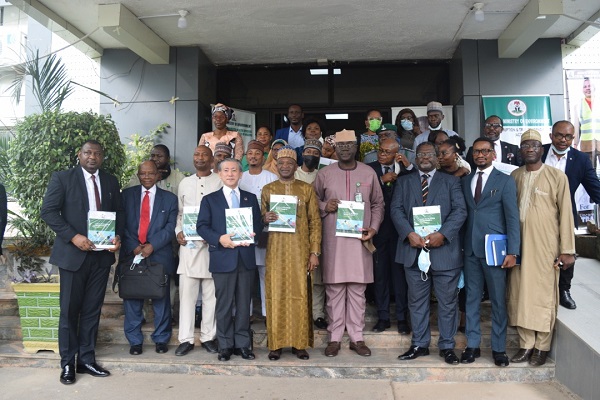
The Federal Government has unveiled the report on the study on available sustainable alternative materials to plastics innovative packaging and recycling technologies that meet market needs in Africa to reduce plastic leakages to the environment.
The report, funded by the Japanese government and implemented by the United Nations Industrial Development Organization (UNIDO), was received and unveiled by the Minister of Environment, Dr. Mohammad Abubakar at the ministry today (July 15) in Abuja.
The minister, in his remarks, said the report could not have come at a more auspicious time in view of daunting challenges Nigeria is facing as a result of plastic pollution.
“Plastic pollution has become one of the gravest environmental problems confronting the global community with impacts transcending national, regional and international boundaries. The magnitude of the problem is reflected in the fact that each year about eight million tonnes of plastic toxic wastes end up in our oceans and if this trend continues, it is projected that there would be more plastic than fish in our oceans.
“Nigeria, with a population of about 200 million people generates about 1.5million tonnes of plastic wastes every year of which less than 10 per cent is recycled. The problem of plastics pollution in the country is exersabated by inadequate waste management infrastructure, poor behavioural attitude, unskilled waste collection workforce, indiscriminate dumping and burning of plastics wastes, poor awareness, inadequate funding etc,” he said.
It is against this background, Abubakar pointed out, that “we welcome this particular study on available sustainable alternative materials to plastics,” saying the study was part of a series of actions being undertaken by government to address the challenges of plastic wastes in the country in a holistic and sustainable manner, particularly in our quest for alternatives to drive investment in the right direction and support sustainable development objectives to which Nigeria subscribes.
In his message, the ambassador of Japan to Nigeria, Mr. Matsunaga Kazuyoshi, said though Japan is very far from Nigeria, both countries are connected through nature, adding it was in that regard the duo could work together on the dangers posed to the ocean and the environment.
“Japan is a very small country, about 40 per cent of the size of Nigeria, however, Japan is a maritime nation with the longest coastline in the world; therefore, it is obvious that maintaining the maritime is of great importance to the nation. Japan is committed to helping developing nations to tackle plastic pollutions by adopting sustainable waste management, and this study is an example of such support from the government of Japan,” he said.
According to the envoy, the country is at the forefront of promoting global awareness on the issue of plastic pollution by sustaining various projects around the world.
He expressed hope the study would bring great value to the global effort in sustainable waste management.
Earlier in his welcome address, the permanent secretary, Ministry of Environment, Mr. Abel Enitan, described the report as apt, saying it came at a time of urgent need to fight plastic pollution in the country in a holistic and sustainable manner.
He stressed that though the plastic industry contributes significantly to the nation’s gross domestic product (GDP) to the tune of N300 billion annually, the misuse of plastics and poor management of plastic wastes posed grave dangers to the environment and health.
“Plastic pollution is a global problem and one of the ways to address it is by finding alternative materials to the use of plastics. This is why this study is a very important component of our national plastic waste management programme,” he added.
Presenting his goodwill message, the UNIDO country representative and regional director for West Africa, Mr. Jean Bakole, said the UN agency working in close coordination with the Federal Ministry of Environment, implemented the assessment which was piloted in Lagos State and the Federal Capita Territory (FCT), Abuja.
Represented by Dr. Otu Osu, Bakole, said great lessons had been learnt from the study which would open up a lot of opportunities on legal and regulatory frameworks, technologically, administratively, and financially, adding it would also promote a circular economy from plastics to the Nigerian economy.
Speaking to journalists, a UNIDO environment expert, Oluyomi Banjo, said the report had given a very strong baseline for plastic waste management in the country piloting with the Lagos State government and Abuja which are two strategic cities in the country, going by the administrative structure and industrial structure with population.
“So, this report has given a very strong baseline which the country can use to implement plastic management activities and also implement the national policies and solid waste and plastic waste management,” he added.


